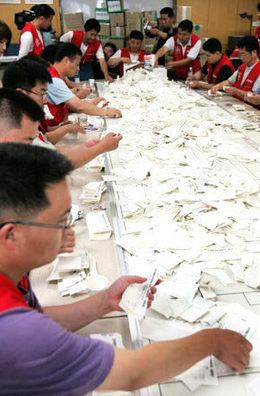 |
|
A group of Hyundai Motor Co. workers calculate the vote for a strike. The tally was held at the office of the trade union in Ulsan, June 30.
|
Partial strike turns into large-scale walkout
With labor and management failing to see eye-to-eye on several issues, unionized workers of Hyundai Motor Co. are edging closer to a full walkout strike, threatening to cause significant production losses for South Korea’s largest automaker. Hyundai is already reeling from charges brought by the government against chairman Chung Mong-koo, including maintainance of an illegal slush fund. The unionized Hyundai workers, one of the most active labor groups in South Korea, have staged partial strikes for 13 consecutive days, laying down their tools for a daily average of six hours. On Wednesday, as management and labor continued to fail to find common ground, the union workers extended their strikes to 12 hours daily--6 hours each for day and night shifts--with workers in the repairs unit of its Ulsan and Jeonju plants to join the strike starting July 13.Even sales workers at Hyundai Motor Co., who have so far not been part of the walkout, are expected to participate in some way beginning the end of the week, sources say. This current labor movement, which began in April, has cost the company 47,000 units in lost production, worth 645.9 billion won (650 million USD) in sales, and the losses are likely to expand further, company officials said. One of the sticking points for labor in the negotiation is a demand for a wage increase. Labor wants a 9.1 percent hike in basic wages for the year, along with other measures designed to improve working conditions. But Hyundai Motor had failed to provide its own figure until July 11, when it suggested a 4.4 percent hike, but the offer was rejected by the union group. Compounding Hyundai Motor’s woes is the management vacuum left by the arrest of Chairman Chung Mong-koo in April for his alleged involvement in the creation of slush funds and other murky business practices.






